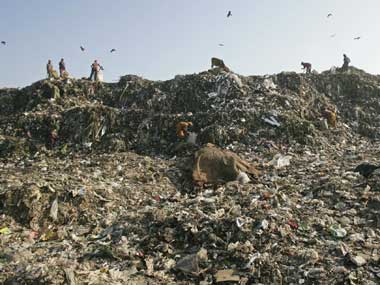It is a criminal, non-bailable act, but “manual scavenging” continues unhindered, as this video of three men—all Valmikis, or Dalits, lowest of Hindu castes—working with no protective gear in a sewer in a Gujarat town reveals. “We do not have any illegal forms of work,” Charu Mori, chief executive officer of Dhangadra town in Surendranagar district, told Video Volunteers, a global advocacy that provides disadvantaged communities with story and data-gathering skills. “Manual scavenging (cleaning sewers and clearing human excreta from open-pit toilets) is a prohibited act.”
So what are these workers doing? They are employed by contractors, whose responsibility they are, said Mori. The situation in Dhangadra illustrates why thousands across India, almost all Dalits, continue to
die in sewers and remove human excreta with bare hands, even in
cities with sewer-cleaning machines. [caption id=“attachment_640837” align=“alignleft” width=“380”] Representational image. Reuters[/caption] As many as 12,226 manual scavengers were identified across India—82% of these are in Uttar Pradesh—according to a
reply to the Rajya Sabha (Parliament’s upper house) on May 5, 2016, by Minister of State for Social Justice Vijay Sampla. These are clearly under-stated official figures. Gujarat, for instance, admits to having no more than two manual scavengers, according to government
data. The persistence of manual scavenging is
linked to the Hindu caste system, with about 1.3 million
Dalits, mostly women, make a living as manual scavengers across India. Primitive latrines—where excreta is physically cleared—prime reason for manual scavenging As many as 167,487 households reported a member of the household as a manual scavenger, according to an earlier
reply in the Lok Sabha (Parliament’s lower house) by the Ministry of Rural Development on February 25, 2016, based on the Socio Economic and Caste Census 2011. Manual scavenging is
prohibited under the Prohibition of Employment as Manual Scavengers and their Rehabilitation Act, 2013, a law promulgated on December 6, 2013, nationwide, except Jammu and Kashmir. The prime reason why manual scavenging continues, according to the government, is the existence of primitive “insanitary latrines”, meaning those without water, where the excreta must be physically removed. Andhra Pradesh, Assam, Jammu and Kashmir, Maharashtra, Tamil Nadu, Uttar Pradesh and West Bengal accounted for more than 72% of insanitary latrines in India, according to a United Nations
report, quoting the House Listing and Housing Census 2011. There are more than 2.6 million
dry latrines in India, according to Census 2011. In addition, there are 1,314,652 toilets where excreta are flushed into open drains and 794,390 dry latrines where human excreta are cleaned manually. About 12.6% urban households and as many as 55% rural households in India defecate in the open, IndiaSpend had
reported earlier. Around 1.7% households across India defecate in the open despite having toilets as sanitation remains a major challenge across the country. 1.3 million Dalits make living as manual scavengers, most are women Manual scavenging is the
practice of manually cleaning, carrying, disposing or handling in any manner human excreta from dry latrines and sewers. Manual scavengers are from India’s poorest and most disadvantaged communities. The practice of manual scavenging in India is linked to the caste system where so-called lower castes are expected to perform the job, according to this UN
report. An
estimated 1.3 million Dalits in India, mostly women, make their living through manual scavenging. UP, the state with the most officially acknowledged manual scavengers (10,016), admits to 2,404 in urban areas and 7,612 in rural parts.
Source: LokSabha
UP’s Badaun district reported various health and hygiene issues in 2009 because of the widespread presence of dry toilets. The district reported the highest infant mortality rate (110 deaths of infants per 1,000 births) in the state and frequent outbreaks of epidemics like diarrhoea, dysentery, intestinal worms and typhoid. It also reported more cases of wild polio virus than anywhere else in India.
In 2010, the UP State government launched the Daliya Jalao (Burn the Basket) initiative, a reference to the basket in which excreta are carried. As many as 2,750 manual scavengers were freed within a year by converting nearly 80,000 dry latrines into pour flush latrines. No new polio cases were reported since 2010. Diarrhoea cases declined by 30% in one year from 18,216 in 2009-10 to 12,675 in 2010-11. Manual scavengers are given one-time cash assistance of Rs 40,000 each. Maharashtra reported the most–68,016–manual scavenger households, accounting for 41% of such households nationwide. Madhya Pradesh (23,105) is next, followed by Uttar Pradesh (17,390), Karnataka (15,375) and Punjab (11,951). These five states account for 81% of India’s manual scavenger households. The government aims to make India scavenging-free by 2019. The Indian Railways are the largest employer of manual scavengers, with an unknown number on their rolls, IndiaSpend reported. (This story is the result of a collaboration between Video Volunteers, a global initiative that provides disadvantaged communities with story and data-gathering skills, and IndiaSpend. Mallapur is a policy analyst with IndiaSpend.) (Indiaspend.org is a data-driven, public-interest journalism non-profit.)


)
)
)
)
)
)
)
)
)



